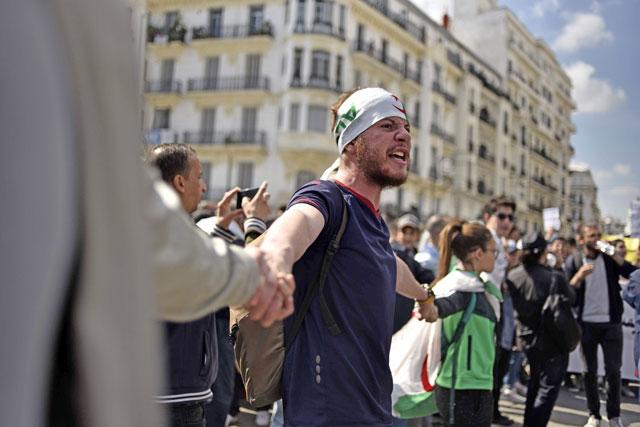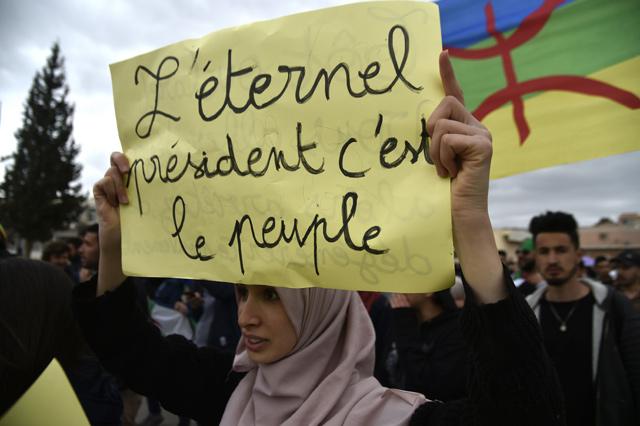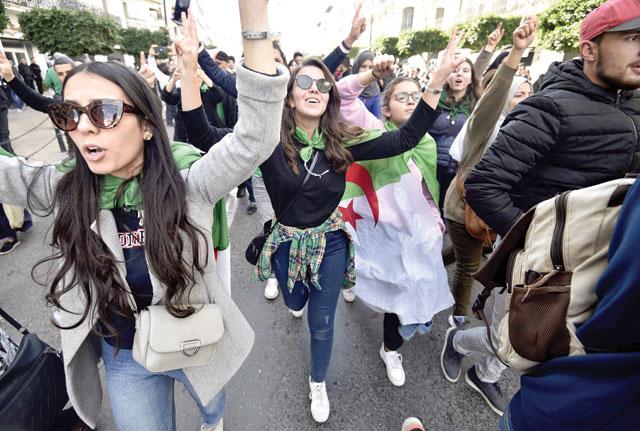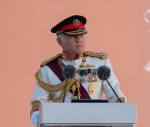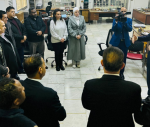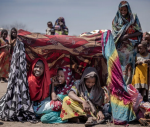You are here
Algeria army chief demands Bouteflika be declared unfit to rule
By AFP - Mar 27,2019 - Last updated at Mar 27,2019
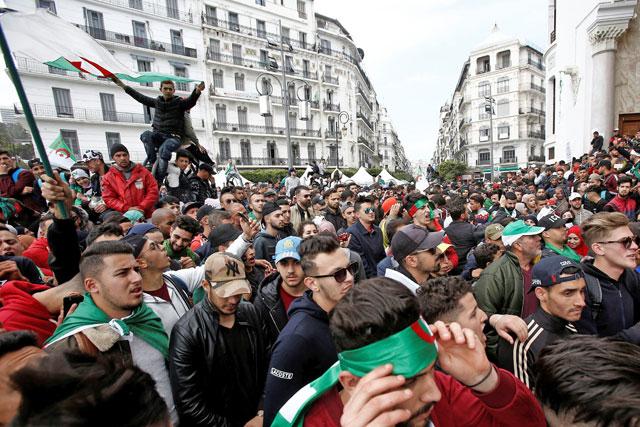
People carry national flags during a protest calling on President Abdelaziz Bouteflika to quit in Algiers, Algeria, on Tuesday (Reuters photo)
ALGIERS — Algeria's army chief called Tuesday for President Abdelaziz Bouteflika to be declared unfit to govern, following weeks of mass protests demanding the ailing leader step down after two decades in power.
The move would potentially clear the way for elections to be organised in the coming months unless the president recovers.
"It is necessary, even imperative, to adopt a solution to get out of the crisis which responds to the legitimate demands of the Algerian people, and which guarantees the respect of the provisions of the constitution and safeguards the sovereignty of the state," General Ahmed Gaid Salah said in a televised speech.
The armed forces chief of staff, considered loyal to Bouteflika who appointed him in 2004, added that the solution “is in article 102” of the constitution, putting the onus on the president either to resign or be declared unfit to govern by a vote of Parliament due to a “serious and durable illness”.
The 82-year-old leader uses a wheelchair and has rarely appeared in public since suffering a stroke in 2013. He has often flown to France or Switzerland for treatment.
Bouteflika said last month he would run for a fifth term in office, despite concerns about his ability to rule, triggering a wave of protests that brought hundreds of thousands into the streets.
On March 11, after returning home from medical checkups in Switzerland, he made the surprise announcement that he was pulling out of the race.
But he also postponed the elections, angering protesters who saw the move as a ploy to stay in power.
Although credited with helping foster peace after Algeria’s decade-long civil war, Bouteflika has faced criticism for alleged authoritarianism.
His current mandate expires on April 28.
‘Fossilised power’
Article 102 of the Algerian constitution states that if the president is unable to govern due to a “serious and durable illness”, the head of the constitutional council, Tayeb Belaiz, a Bouteflika loyalist, can launch a procedure to remove declare him unfit to carry out his duties.
The council must first meet to verify that the president is unable to perform his duties and then inform parliament to declare him unfit by a two-thirds majority vote with both houses sitting.
The head of the senate then takes over as acting president for a 45-day period. If the presidency is still deemed “vacant” or if Bouteflika has resigned, the interim can serve for a maximum 90 more days during which presidential elections are organised.
The call from the chief of Algeria’s powerful military was welcomed with car horns honking in Algiers but also with caution.
“It will not solve the crisis. The people are not only calling for the departure of Bouteflika but of all the [political] system,” Oumeima Khellah, a 24-year-old student, told AFP.
Mohand Chertouk, an electrician, said the general’s call was “just an attempt to win more time” as he also called for a “deep overhaul” of Algeria’s political system.
“No one should underestimate the power of the street,” added Chertouk in reference to weeks of protests across Algeria calling for change.
Earlier Tuesday, hundreds of students who have been at the forefront of the protests were back on the streets of Algiers.
They were led by a group in traditional costumes representing several regions of the country, and holding signs saying: “we are all Algerians, we are all united.”
“Algerian leaders think we will give up... of course not. We will be back here every Tuesday until they all leave,” said Sayet, 24, who studies architecture.
Samy Bouchaib, a researcher with the state-run renewable energy development centre, joined the rally in the square outside the capital’s main post office.
“We are opposed to fossilised power. We need a renewable power with youthful competences,” said Bouchaib.
There were also demonstrations in the Mediterranean port city of Bejaia where several hundred students marched, vowing to keep up the pressure.
“We want to continue marching even during the holidays,” said Saidi Mohamed, as fellow students around him chanted slogans calling on the country’s political system to “get out”.
They were joined by farmers driving tractors and employees of the state-run forestry department in their khaki uniforms.
“What is happening is unprecedented in the history of Algeria. We all lived to see this moment,” said Sabrina Zouagui, a teacher of French literature who joined the protests.
“We must say no to the [political] system and move toward a state of law,” she added.
Related Articles
ALGIERS — Hundreds of students hit the streets of the Algerian capital Tuesday dismissing President Abdelaziz Bouteflika's promise to resign
ALGIERS — Algeria has been rocked for more than a month by unprecedented protests against ailing President Abdelaziz Bouteflika, sparke
ALGIERS — Thousands of Algerians demonstrated for a boycott on Wednesday on the eve of a widely unpopular presidential election.Police in th


